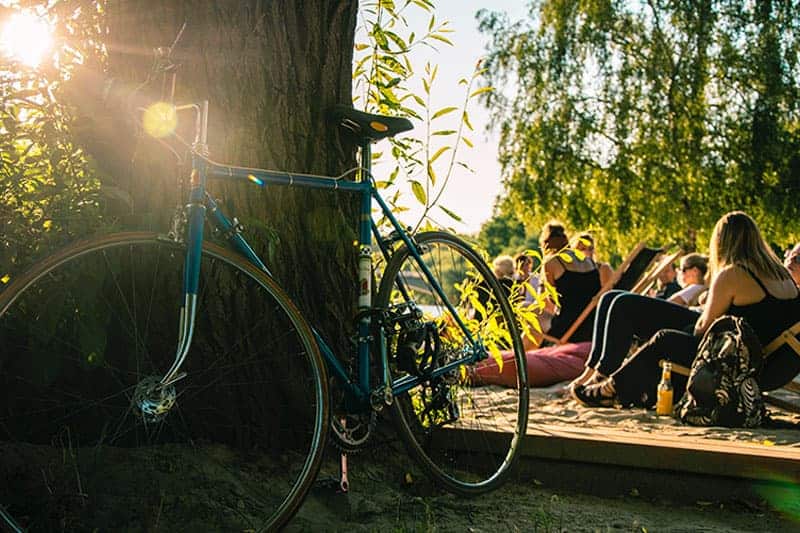Can you really save money sustainably by living as environmentally consciously as possible? That's a question that I can answer with a double and triple YES carved in stone. Saving money actually means actively putting something aside every day - for example, to fulfill your dreams. But it's even cooler to simply spend less money by adopting a sustainable lifestyle and save money along the way. This is passive saving 2.0, so to speak.
In this article, I would therefore like to share my best Money-saving tips for everyday life on the basis of a sustainable lifestyle on the way. The reasons I am about to give you will also help you to consume more sensibly in future and significantly improve your personal eco-balance. Let's go!
Tip: We often hear that an environmentally friendly life is so expensive. This may be true in the short term from time to time. But if you learn to think sustainably, you will save a lot of money over the long term. So please share this article with people who think an environmentally friendly life is too expensive.
20 reasons why an ecological lifestyle saves money

Have you always wondered how you can actually save a relatively large amount of money in the long term? One sensible solution, for example, is to simply spend less and still enjoy a high quality of life to enjoy. Because owning a lot doesn't automatically mean that everything is great. The reasons for saving money sustainably by living as consciously and naturally as possible will reinforce your decision for a long-term sustainable lifestyle.
1. sustainable thinking people consume less
Let's start with a basic argument: Just because there is money doesn't mean you have to spend it. If you think sustainably, you save Money for the finer things in life and don't spend it on fidget spinners or other things that are absolutely superfluous. If you have nature in your heart, then you consume more consciously - only the things you really need. Nowadays, every corner tries to trigger us to buy something. Whether through smells, large advertising posters or influencer marketing. So by questioning all your potential purchases, you will buy significantly less and save a lot of money in the future.
2. save energy and therefore money
So far, only just over 40% of the electricity mix in Germany comes from renewable energies.₁ This is one of the reasons why environmentally conscious people save energy and therefore money by living sustainably. Whether LED lamps in the home or quickly closing the fridge. Even in the car, the Air conditioner instead, the cooling airflow is used when the window is open sustainable driving saves fuel and money. The best example are certainly also Energy-saving houses with good insulation and energy generated by solar power, for example.
Ultimately, this saves you a significant proportion of your annual energy costs every day.
Tip: You can find out more in my article about Energy saving tips.
3. tap water instead of expensive mineral water
Did you know that tap water is up to 250 times cheaper than mineral water from a plastic bottle? We enjoy the privilege of already having running, drinkable water in our homes. You may also save yourself a car journey to the supermarket and counteract the drinking water companies that have a strong influence in many regions of the world. Water shortage provoke - Nestlé, for example, is therefore under constant criticism.
Even on the road you can get your own water bottle for example with the App Refill can be refilled free of charge in participating restaurants. So by going green, you can save money and do something good at the same time.
4. a large part of the water costs are saved
Although people who think sustainably drink tap water, they generally use significantly less water. For example, they take shorter showers and turn off the shower when soaping up. Under certain circumstances cold showeredinstead of hot. In addition to many liters of water, this also saves heat energy. Water consumption in the garden should not be neglected either - if you let nature run its course in your garden, you generally have to water much less. This is because tall grass means the soil doesn't dry out as quickly, for example. So by saving water at home, you also save money.
Tip: Read the article about the Save water in the home even more free tips.
5. save money by reducing household waste
Environmentally conscious people are often also advocates of a waste-avoiding lifestyle. This means that less waste is produced. And if it does, then the Waste properly separated. For example, we use a worm composter in which our organic waste becomes fertile soil and does not have to be transported away. In any case, the personal Fees for waste disposal significantly lower in this way.
Apart from that, environmentally friendly food is increasingly available without packaging, so that waste charges are automatically kept as low as possible.
Tip: You can find out more about this in the article about the plastic free shopping.
6. food is consumed more consciously
Who environmentally conscious ticks, people generally consume more sustainably - but this is particularly true of our food. Many people eat a vegan diet or Become vegetarian - and just do without meat. High-quality food is often very expensive, while plant-based alternatives are usually available at a much lower price. In addition, there are more and more self-sufficient people who grow their own food at home or in a community farm. This saves money in the long term and benefits the environment and society.
7. larger purchases are more durable and efficient
For larger purchases - for example a refrigerator or a washing machine - environmentally friendly people invest in energy-efficient and durable appliances. In this way, natural resources are used for longer and large portions of energy costs are saved. Ultimately, of course, your own wallet will also be happy.
8. second hand purchases are cheaper
Buying and using second-hand items not only saves natural resources for new production, but also saves money in the long term.
Since more and more but not yet many people implement this money saving tip, the problem is Fast Fashion has emerged. New, cheap items of clothing are no longer only brought onto the market on a seasonal basis, but almost every week. As a result, many people are increasingly buying cheap, low-quality clothing that is thrown away more quickly. Second-hand is therefore a sensible approach to slowing down fast fashion and saving a lot of money in the long term. What's more, your closet won't overfill over time, as you can also sell clothes you use yourself. And the best thing is: second-hand is of course A real money-saving tip, not only for clothing.
9. old contracts are regularly reviewed
Those who think more long-term and sustainably usually pay a little more attention to what they spend their well-earned and perhaps also saved money on. Old contracts often lead to high costsalthough the services are now significantly cheaper. For this reason, many people check their regular account debits in order to reduce costs and save money. For example, switching to Green electricity or to a Ecobank enormous money-saving potential and at the same time you can ensure that the money is invested sustainably. What's more, switching is absolutely straightforward.
10. environmentally conscious people vacation differently
Those who live sustainably ensure that they fly halfway around the world less often, but also appreciate nature in Germany and Europe. Shorter travel distances ensure that you also save money on your vacation. How about a trip to Kochel am See in Bavaria or Saxon Switzerland, for example?
In addition much more time in nature a place where you basically enjoy yourself more than spending money.
Tip: If you don't have an alternative to a flight, then make sure you use the advice from the article about the Flying as sustainably as possible.
11. save money with a cup of coffee

Converted, one kilogram costs Coffee from capsules 70 euros and leaves behind around 8,000 tons of plastic waste every year.₃ Would you ever buy a capsule coffee with this knowledge? People with an environmentally conscious lifestyle prefer to buy Fairtrade bean coffee, which is of course still much cheaper despite the environmental label.
Tip: Coffee is also often cheaper in many cafés if you bring your own. CoffeeToGo mug brings or drinks on site.
12. CO2 and save money on mobility
Cost-effective and environmentally friendly routes with the lowest possible CO2-emissions used to get from A to B. The Long distance bus for example, is usually much cheaper than the domestic flight. Also Train rides are often cheaper and not as time-consuming as you might think. Nowadays, many people don't even have a CarThis saves both money in use and the often high cost of acquisition.
Tip: At Article about car-free living you can find out how you can manage without your own car if possible.
13. carpooling and carpooling are cheaper
Of course, there are also regions where public transport connections are less developed than in urban areas - or for other reasons entirely, depend on the car to be. Even in such cases, you can of course save money in a sustainable way. For example, by Carpooling uses or offers itself. In this way, the eco-balance of every passenger is automatically improved - and everyone also saves money. Of course, the same applies to the Carpooling - for example, for the daily commute to and from work.
14. save money with a natural garden
Natural fertilizers and pest control, less water consumption for irrigation thanks to taller grass and, ultimately, fewer vacation trips because your own garden is already a truly diverse and lively place. Natural paradise is. You can save money here, for example, by letting nature take care of everything instead of buying expensive gardening products. It's also a good idea to grow your own free food.
Tip: Click to the article about Sustainable gardening to get the best tips for your natural garden. Incidentally, your balcony can also become a natural paradise.
15. less disposable, but more durable
This money-saving tip for everyday life is all about avoiding waste, plastic free lifestyle a role. Why do we spend so much money on disposable products such as cotton pads, razors, straws, OBs, plastic bags, barbecues and even tents every time? (see Zero Waste Festival)
The economical alternative - which the industry doesn't laugh at every day - is the Reusable products on the hand. Washable Fabric cotton pads, by Stainless steel razor, Glass straws, a Menstrual cup, durable Nature bags and of course reusable barbecues and tents, for example.
All this is eternal reusable and saves an incredible amount of money over the lifetime of the product. What you could do with it... it's really cool.
16. few home remedies instead of many chemical pistols
Of course you need not a different cleaner for every cleaning task to buy. With Baking soda, Washing soda, Vinegar, Citric acid and also Curd soap you may have already seen some of the Home remedy that will save you the high cost of countless household cleaners.
Here are some DIY examples for your household:
- Soda applications
- Washing soda applications
- Citric acid applications
- Make glass cleaner yourself
- Make oven cleaner yourself
- Make your own washing-up liquid from ivy
Tip: Just let yourself to this a little bit in the DIY household blog inspire.
17 Borrowing, repairing, exchanging, doing it yourself instead of buying a new one
The Zero Waste Lifestyle is no longer a trend - more and more people are learning to produce less waste in their everyday lives. In this way, for example, natural resources are saved for superfluous plastic packagingbut also for Common articles of daily use saved. For example, borrowing a drill from a neighbor instead of buying it yourself. Sharing things has finally come back into fashion. What's more, repairs, swaps and DIY ideas are increasingly making new purchases superfluous. By giving existing materials more value again, you can also save money in the long term.
18. reusable cloths are used
A good way to save money on disposable wipes are classic cloths. Did your grandpa always have a reusable cloth handkerchief? Mine did too. That's why it's one of the The most sustainable life hacks of our grandparents - from a time without disposable plastic. You don't really need the now classic roll of kitchen paper either. Washable cloth towels are also useful for cleaning.
19. people who think sustainably pay particular attention to their health
Not only a sustainable lifestyle, but also a healthy one in particular can help you save a lot of money. For example, you can save on the cost of increasingly expensive Cigarettes. Worldwide land every day also still 10 billion of the Butt butts in the environment.₄ This is a good example of how a sustainable everyday life promotes your own health and that of our environment. That's why, for example, many people prefer to cycle for free instead of taking the car. And spend less money on binge drinking, which you won't remember the next day anyway.
20. free bike instead of fuel and ticket costs
Anyone who cycles regularly, saves money on fuel for the car or public transport tickets. Riding your own bike is simply free and super flexible. If you think environmentally friendly, you can also save a lot of money on everyday mobility.
Living environmentally conscious and saving money is easy

These were just a few of many possible tips for saving a lot of money with a sustainable lifestyle. As you have noticed, you save money above all by thinking sustainably in the long term and not in the short term.
I hope that these money-saving tips for everyday life will help you to have a little more left over at the end of the month in future. For example, for a nice weekend trip in Germany's unique nature.
Do you have any questions, tips or your own experiences with saving money through an environmentally conscious lifestyle that you would like to share? Then please leave me a comment.
Stay sustainable,

PS.: Be sure to look a little more in the Blog about a sustainable Ljust around. For example, in one of the articles you will learn how to develop your own business idea. Founding sustainably simply by following your heart.
References:
₁ Frankfurter Allgemeine Zeitung (2019): Green electricity share in Germany exceeded 40 percent for the first time in 2018 (as at: 03.01.2019) https://www.faz.net/aktuell/wirtschaft/oekostrom-anteil-in-deutschland-2018-erstmals-ueber-40-prozent-15969940.html. [09.08.2019].
₂ ECOVENTA GmbH: Plastic is not fantastic. The sustainable alternative to tap water. (Status: 15.09.2017). https://veggienale.de/plastik-ist-nicht-fantastisch-die-nachhaltige-alternative-leitungswasser. [09.08.2019].
₃ Nicolai, B.; Axel Springer SE (2017): Nespresso won't let go of aluminum (as of: 14.11.2017). https://www.welt.de/wirtschaft/article170606900/Nespresso-will-nicht-vom-Aluminium-lassen.html. [09.08.2019].
₄ World Health Organization: World No Tobacco Day 2017: Beating tobacco for health, prosperity, the environment and national development (as of 30.05.2017). https://www.who.int/news-room/detail/30-05-2017-world-no-tobacco-day-2017-beating-tobacco-for-health-prosperity-the-environment-and-national-development. [09.08.2019].







Hello, I find your tips really helpful. I have already changed my lifestyle in part. For example, no plastic bags, buy children's clothes rarely new, properly separate waste, avoid garbage. .... When something breaks in the household, it is replaced if it is important. Of course, no longer made of plastic. Unfortunately, I catch myself but again and again in the old pattern to buy cheap to fall. But I have already changed a lot this year and every small step is a success.
Love greetings Romana
Hi Romana! Great, thank you for your feedback. That's not bad at all to fall into "old patterns" once in a while. If you improve slowly but steadily and already feel the improvement, you are on the best way 🙂 .
Many greetings,
Christoph